Today, turbochargers are commonplace, and one of these forced-induction methods of propulsion is likely under the hood of your own car as well as the one in front. They gained traction over the years thanks to the benefits of smaller engines and the increased potential for fuel economy, as well as lower levels of pollution. The small three-cylinder turbo under the hood of your average compact crossover isn’t built for lightning-fast speeds or charisma, however.
For those with a hunger for a sports car that lights up as soon as the turbine hits its peak, there are a variety of options that will satiate those who want the punch of the turbocharger and the thrill of a sports car at varying price points. These are all relatively underrated options, from the modest value of an exotic Lotus Elan all the way up to the futuristic BMW i8.
To give you the most up-to-date and accurate information possible, the data used to compile this article was sourced from the various manufacturers, and used values are courtesy of Kelley Blue Book and Classic.com.
1989–1996 Lotus Elan
Average Used Value: $14,000
Built from 1989 to 1995, this British sports car was intended to be more of a volume seller, appealing to a wider audience and, specifically, the US. Despite the brand’s decision to use front-wheel drive — the first time the brand tried this unusual drivetrain for a sports car — the M100 Lotus Elan was noted for its great handling, and performance was adequate thanks to Lotus’ philosophy of prioritizing weight over outright power.
|
1989-1996 Lotus Elan Specs |
|
|---|---|
|
Engine |
1.6-liter, turbocharged I4 |
|
Power |
162 hp |
|
Torque |
148 lb-ft |
|
Transmission |
5-speed manual |
|
Drivetrain |
Front-engine, front-wheel drive |
An Isuzu engine under the hood was offered with or without a turbocharger, but the 162-horsepower Elan Turbo SE was the bigger seller thanks to its extra 30 horsepower and 0-60 mph potential in the six-second range. Today, the Elan is a rare sight, and this, along with its baby-supercar looks, makes it an exciting alternative to the ubiquitous Mazda Miata despite the latter’s superior dynamics and iconic status.
|
Strengths |
Weaknesses |
|---|---|
|
|
2011–2016 BMW Z4 sDrive28i
Average Used Value: $17,500
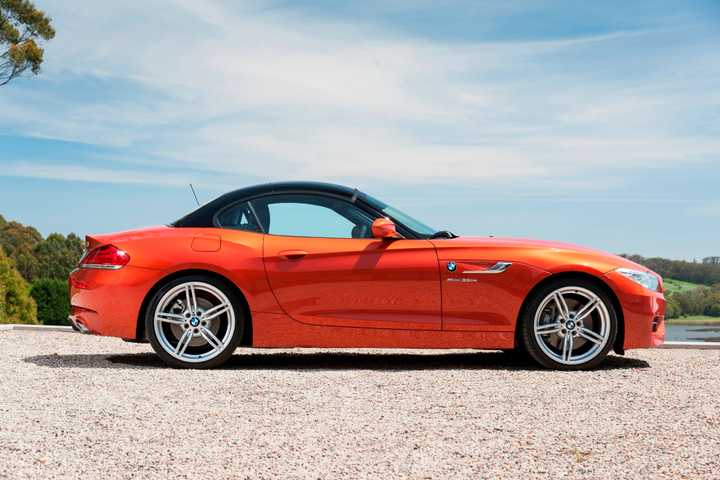

- Base Trim Engine
-
2.0L Turbo Inline-4 Gas
- Base Trim Transmission
-
6-Speed Manual
- Base Trim Drivetrain
-
Rear-Wheel Drive
- Base Trim Horsepower
-
240 hp
- Base Trim Torque
-
260 lb-ft @ 1450 rpm
Turbocharged sports cars don’t come much better than the E89 BMW Z4 thanks to its well-rounded package, modern cabin, attractive styling, and decent performance. Unlike the Elan above, the Z4 is rear-wheel drive and built to German standards, as well as about 15–20 years newer. The lowest average values are from the 2011-2016 age range, which is from the second generation of Z4, which started in 2009. At just under $50,000 when new in 2012, the sDrive28i was the entry-level model, equipped with a 2.0-liter, turbocharged four-pot.
At the top of the range was the $65,000 sDrive35is with its twin-turbo inline-six and 335 horsepower, but the 240-horsepower sDrive28i could hit 60 mph in a respectable high-five-second time, just a second behind the flagship. Drawbacks include the small trunk, made worse by the standard folding hardtop for this generation, but this is a sports car, and such complaints might be irrelevant. The refined cabin, German build quality, and younger age make it a great choice for those looking for a daily drivable two-seater.
|
Strengths |
Weaknesses |
|---|---|
|
|
2016–2020 Mercedes-Benz SLC 300
Average Used Value: $23,000
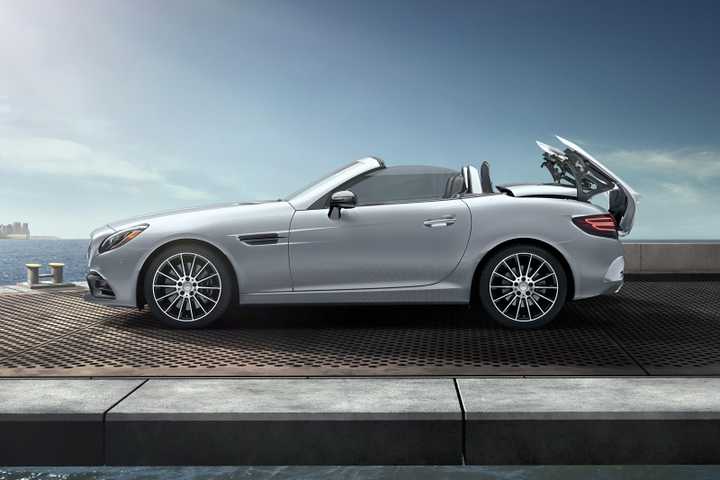
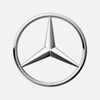
- Base Trim Engine
-
2.0L Turbo Inline-4 Gas
- Base Trim Transmission
-
9-Speed Automatic
- Base Trim Drivetrain
-
Rear-Wheel Drive
- Base Trim Horsepower
-
241 hp
- Base Trim Torque
-
273 lb-ft @ 1300 rpm
Mercedes-Benz’s SLK was renamed the SLC during its third and final generation, now a far cry from the boxy first generation and offering sleek styling that still looks fresh today. Like the Z4, the SLC features a retractable hardtop and rear-wheel drive, with German build quality and a refined interior thrown in for good measure. Many sources suggest that the SLC is more suited to cruising than chasing apexes. Still, its comfort is bolstered by a punchy and turbocharged 2.0-liter four-cylinder engine with 242 horsepower and the potential to hit 60 mph in the mid-five-second range.
In 2015, the SLC 300 was accompanied by various other models in the lineup, and by 2017, the new SLC range consisted of this, the turbocharged SLC 300 base model, and the twin-turbo AMG SLC 43 with about 360 horsepower. The SLC 300 represents good value and more approachable running costs with all the sleek styling and cachet that comes standard with the SLC.
|
Strengths |
Weaknesses |
|---|---|
|
|
1990–1996 Toyota MR2 Turbo Targa
Average Used Value: $23,500
Toyota’s second-generation MR2 is a ’90s icon with mythical status, an exotic engine layout, and baby-supercar styling. It is one of the current future classics that’s bound to take off in value soon, and its reputation for snap oversteer doesn’t retract from its almost universal appeal. Naturally aspirated versions kicked out about 130 horsepower and offered an automatic transmission, but the turbocharged 2.0-liter variant offered a claimed 200 horsepower and the same pound-feet of torque.
|
1990-1996 Toyota MR2 Turbo Targa |
|
|---|---|
|
Engine |
2.0-liter, turbocharged I4 |
|
Power |
200 hp |
|
Torque |
200 lb-ft |
|
Transmission |
5-speed manual |
|
Drivetrain |
Mid-engine, rear-wheel drive |
The latter is also only available with a manual transmission, but for most, this is the only way a mid-engined sports car should be. Mechanical and electrical issues are sure to be an issue with a 25+ year-old performance car like the MR2, and many will have also been modified, leaving the pristine turbo models as the least affordable. It’s worth investing now in one of these before they become collector fodder. Straight-line performance is respectable today with a 0–60 mph time in the low-six-second range.
|
Strengths |
Weaknesses |
|---|---|
|
|
1991–1992 Porsche 944 Turbo Cabriolet
Average Used Value: $35,000
For a time, the Porsche 944 was the brand’s best-selling model ever, and today, the 944, historically affordable and seen as an ‘entry-level Porsche’, is a future classic in the making. The 944 was sold in naturally aspirated and turbocharged variants, with the 2.5-liter turbocharged four-cylinder making up to 220 or 250 horsepower for the 944 Turbo and 944 Turbo S, respectively. A convertible version of the 944 debuted in 1989, produced by ASC.
|
1991-1992 Porsche 944 Turbo Cabriolet |
|
|---|---|
|
Engine |
2.5-liter, turbocharged I4 |
|
Power |
250 hp |
|
Torque |
258 lb-ft |
|
Transmission |
5-speed manual |
|
Drivetrain |
Front-engine, rear-wheel drive |
For 1991 only, a turbocharged version of the convertible was produced in limited numbers, with most sources suggesting that just 625 examples were made. This model, based on the Turbo S’s 250-horsepower output, was fast enough to hit 60 mph in under six seconds. Rigidity lost when the roof and pillars were removed was avoided with extra welding and reinforcement. These models combine the best of the powerful Turbo S’s performance with the added luxury of a convertible soft top and are likely to become sought-after collector’s items in the future, thanks to their rarity.
|
Strengths |
Weaknesses |
|---|---|
|
|
2017 Porsche 718 Boxster
Average Used Value: $35,500
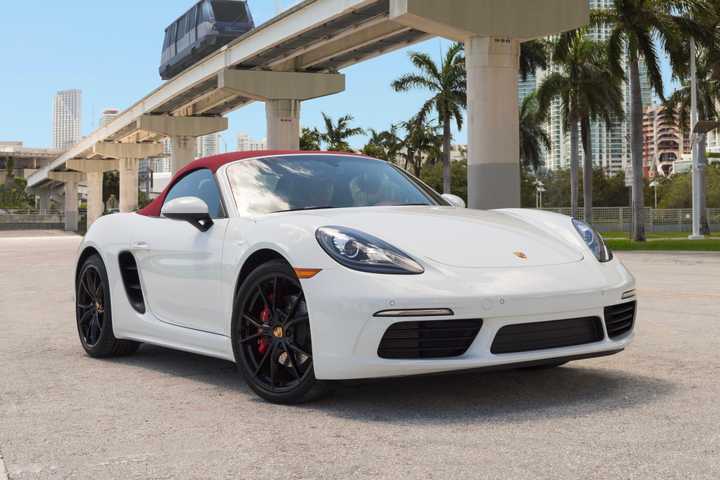
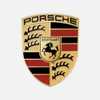
- Base Trim Engine
-
2.7L Flat 6 Gas
- Base Trim Transmission
-
6-Speed Manual
- Base Trim Drivetrain
-
Rear-Wheel Drive
- Base Trim Horsepower
-
265 hp
- Base Trim Torque
-
206 lb-ft @ 4400 rpm
Purists might not have enjoyed the new fourth-gen Porsche Boxster‘s loss of two cylinders and the new turbocharged four-pot engine, but it added 718 as a prefix for both the coupe Cayman and Boxster, meant to invoke the spirit of the 718, which won the Targa Florio race in 1959 and 1960. The new turbocharged flat-four was a punchy engine, despite its perceived lack of character, and could thrust the Boxster to 60 mph in about 5.5 seconds thanks to 250 horsepower and around 230 pound-feet.
These mid-engined sports cars are more affordable than the flagship 911, with relatively lower purchase and maintenance costs, offering authentic Porsche refinement, dynamics, and a similar ownership experience. However, the Boxster is still a Porsche, and requires a Porsche-sized budget to buy and run. As we would expect, early 718 models (the current fourth gen began in 2017) are worth considerably less than nearly new models, and a contingency savings account would complement this 2017 model well. Sadly, the Boxster and Cayman are marked for the chopping block in the future, which is a sign of the times.
|
Strengths |
Weaknesses |
|---|---|
|
|
2015 Alfa Romeo 4C Spider
Average Used Value: $53,000
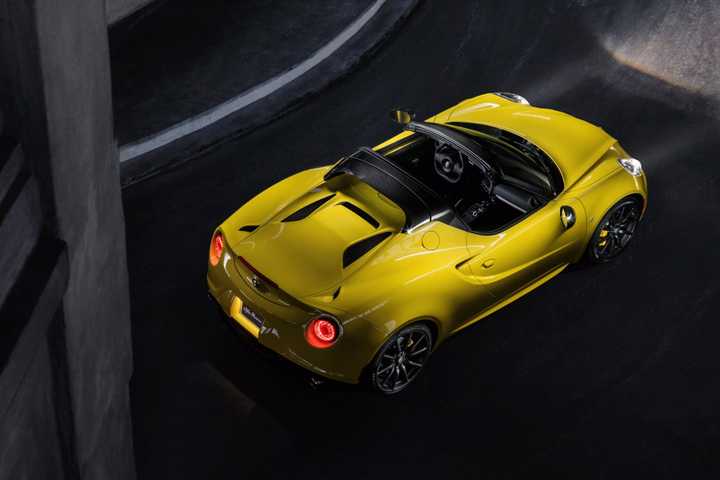

- Base Trim Engine
-
1.7L Turbo Inline-4 Gas
- Base Trim Transmission
-
6-Speed Automatic
- Base Trim Drivetrain
-
Rear-Wheel Drive
- Base Trim Horsepower
-
237 hp
- Base Trim Torque
-
258 lb-ft @ 2200 rpm
Alfa Romeo‘s triumphant return to the US since its hiatus in 1995 was also the return of its mojo — bringing back sports car fun and even a rear-wheel-drive sedan platform. 2015 marked the arrival of the 4C, a proper sports car with a punchy little engine in its midship for dynamic handling and a focus on lightweight with a carbon fiber chassis. The small four-cylinder turbocharged engine could muster around 240 horsepower and 260 pound-feet.
It wasn’t without its issues, and the 4C — sold as a coupe and convertible Spider — has received negative press for its challenging ride and handling that didn’t always live up to the hype. There was also no manual transmission offered, which was surely one of the biggest drawbacks of the driver-focused 4C. Either way, even with its automatic ‘box and its other issues aside, the 4C remains an alluring option, especially while its average values keep it within the reach of many enthusiasts.
|
Strengths |
Weaknesses |
|---|---|
|
|
2015 BMW i8 Roadster
Average Used Value: $54,500
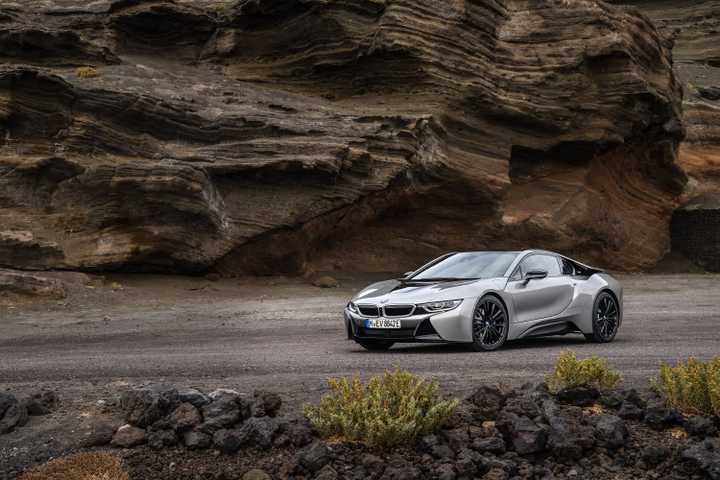

- Base Trim Engine
-
1.5L Turbo Inline-3 Plug-in Hybrid
- Base Trim Transmission
-
6-Speed Automatic
- Base Trim Drivetrain
-
All-Wheel Drive
- Base Trim Horsepower
-
357 hp
- Base Trim Torque
-
420 lb-ft
What is mid-engined, has butterfly doors, can hit 60 mph in the four-second range, and makes close to 400 horsepower? It sounds like a 90s supercar, but the BMW i8 ticked all of these boxes and threw in German build quality with modern technology. It also threw in an exciting new hybrid powertrain, which combined a 1.5-liter, three-cylinder, turbocharged engine (part of the B38 engine family that was used for the Mini) with an electric motor, resulting in all-wheel drive.
This model was discontinued in 2020, with a convertible variant also produced. The electric motor was improved for 2018 with an additional 12 horsepower for a total of 369 horsepower, where the combustion engine pitches in 228 horsepower. The badge might have seemed at odds with the exotic image and price (around $130,000 in 2015), with its small engine falling short of the kind of charisma offered by rivals. Although not a dynamic supercar slayer, this model is alluring today for its eye-catching style, those butterfly doors, its intriguing powertrain, and the fact that, for now, prices remain relatively low.
|
Strengths |
Weaknesses |
|---|---|
|
|

